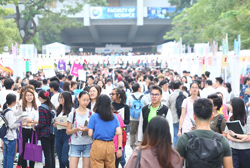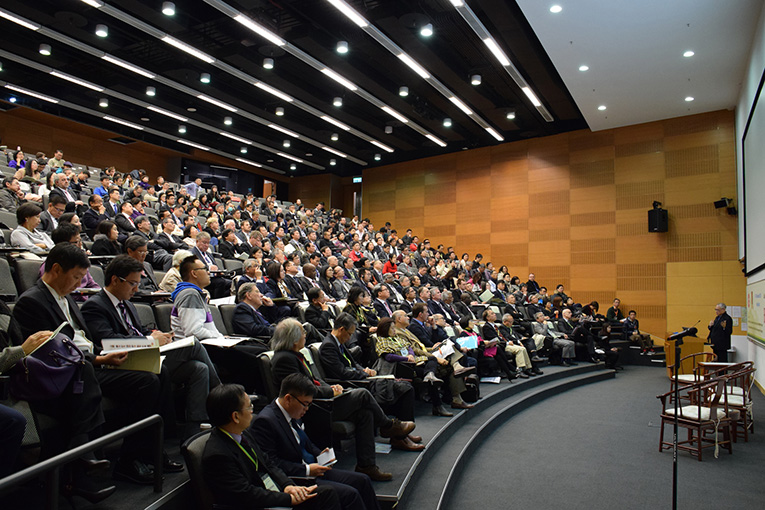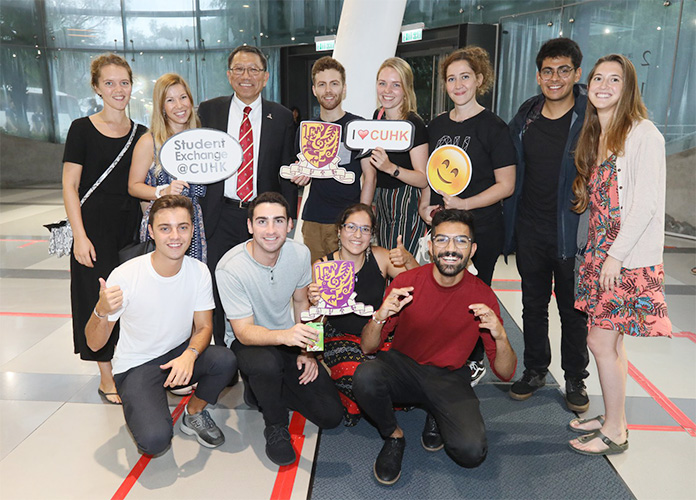
Welcome address to new students

As Hong Kong emerges from the fifth wave of the COVID-19 pandemic, a lot is being said about how the city can recover its status as a major international financial centre, a gateway to the mainland, and a crucial aviation hub. And rightly so. These areas have been fundamental to our historic competitiveness.
But just as imperative is the city’s economic transformation in preparation for the industries of tomorrow. Higher education in Hong Kong, with its globally recognised reputation as a powerhouse of innovation and technology, is a crucial building block for this transformation.
Governments, universities and industry leaders around the world are in a race for talent. Take artificial intelligence for example – it is reported that there are fewer than 25,000 people considered scientific experts in the field. The gap in quantum computing, the technology which will redefine our ability to solve complex problems and revolutionise economies, is even starker – with reports of fewer than a thousand qualified scientists.

The good news is that Hong Kong’s universities are exceptionally well placed to take on these challenges. Five of our universities are comfortably ranked in the world’s top 100, which is an impressive feat for a city of 7.5 million people. Two of our universities are among the top ten of the world’s most international universities. Hong Kong is also the best city for students in Greater China (ranked 15th globally compared to Beijing 25th, Taipei 27th and Shanghai 37th), providing a highly desirable, internationally oriented yet regional destination for mainland students, as well as a beacon for the world to study in China.
These achievements are the envy of governments around the world, and our performance tells a compelling story about the city’s status as a diverse and inclusive global metropolis.
But we can take nothing for granted. Hong Kong should aim higher and recast itself as more than just a financial powerhouse. Its economic clout, rule of law, cosmopolitanism and gateway to the mainland can make it one of the world’s great education and technology hubs: global in outlook yet intimately interconnected with Asia’s most ambitious and exciting economy. We are well poised to be the scientific engine room to power the development of the Guangdong – Hong Kong – Macau Greater Bay Area.
Short of enabling quarantine free travel and reopening our borders, how can Hong Kong practically attract the world’s best and brightest to co-develop our innovation and technology system?
Initiatives such as the Hong Kong government’s $2 billion Global STEM Professorship Scheme are an important step in investing in attracting world-class talent to Hong Kong. The InnoHK scheme, designed to accelerate the commercialisation of research discoveries and partner with global universities, is another tangible example of Hong Kong’s commitment to the innovation agenda. These initiatives should be renewed and scaled up.
But for Hong Kong to truly develop this innovative capacity, more is needed. Attracting top tier professors and elite scientists is important – but we need to cultivate a pipeline of talented scientists, innovators and entrepreneurs so we build sustainable, long-term capacity. The demographic reality of our small and ageing population means we must look beyond our borders.
This means our universities should work in partnership with industry and government to reimagine our global positioning.
Using the Global STEM Professorship Scheme playbook, Hong Kong should invest in initiatives to attract post-doctoral fellows and early career researchers to ensure that Hong Kong is top of mind for talented young people as they graduate with research degrees from the world’s best universities.
But the journey to an elite scientist begins well before a doctoral thesis, and scaling up our cohort of bright mainland and international undergraduate students is an important part of this puzzle. We are already Greater China’s best student destination, and we should invest in scholarship schemes and financial aid to widen access to a Hong Kong degree to students from Belt and Road countries and the Global South.

Hong Kong should also be ambitious in co-investing with the private sector in building an elite scheme for Hong Kong to compete alongside global titans such as the Rhodes Scholarship, and make sure we collaborate with well-established global student mobility schemes such as the EU’s Erasmus Programme, the UK’s new Turing Scheme and Australia’s New Colombo Plan to make sure Hong Kong is on the map for the world’s best undergraduates.
Importantly, once we attract international students to Hong Kong, we should be thinking about how we can retain them. Post-study work visas enabling graduates to pursue career opportunities in student destinations such as the US, the UK and Australia have been decisive in attracting international students and plugging critical skills shortages. We should benchmark our immigration policies against these countries and review opportunities to allow graduates to remain in our city and contribute to our economy, thus fueling the engine that drives development of the Greater Bay Area and beyond.
But perhaps most crucially, we urgently need to get Hong Kong back on the global science community’s radar. Two years of travel restrictions have crippled our ability to showcase our emerging innovation and technology system to the world’s science and higher education leaders. The Financial Secretary has recently called for a forum of world financial leaders later this year – the higher education and innovation sector needs something similar to reacquaint the world with what Hong Kong represents.
And what we represent is clear – a vibrant, open, inclusive and world leading university system which is at the forefront of some of the most exciting scientific discoveries of our time. Our challenge is to harness these strengths, and reconnect with the world as we build for tomorrow’s knowledge economy.